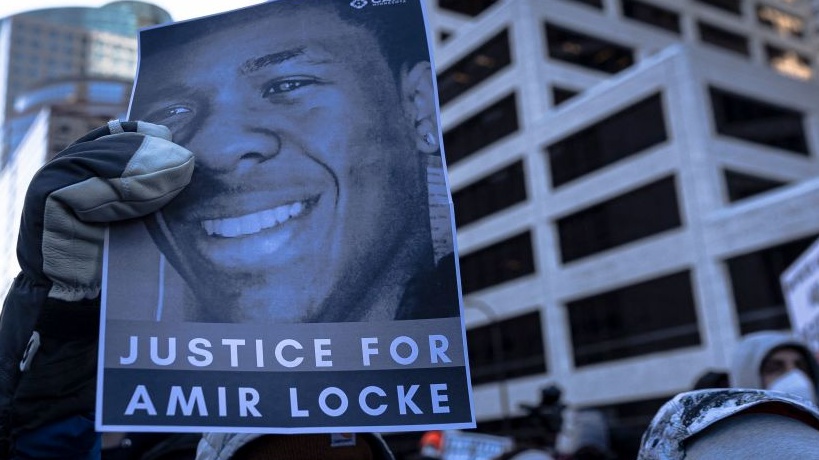A Minneapolis community is demanding justice for Amir Locke, a 22-year-old Black man who was shot and killed when police raided an apartment on Wednesday. According to KSTP, Locke's family said their loved one was asleep at his cousin’s home when officers entered the house early Wednesday morning to execute a search warrant as part of a homicide investigation.
“He was laying on his stomach, under the cover on his stomach, with his face down. I know this kid, I’ve known this kid all his life,” Amir’s father, Andre Locke, said, adding that his son was a "bright light."
Bodycam footage showed officers opening the door with a key and rushing into the home, yelling "Police! Search warrant! Get on the f**king ground!" Amir was sleeping on a couch, covered in a blanket, when police entered the apartment around 6:48 a.m. Officer Mark Hanneman shot the 22-year-old three times as he started to stand up, Fox 9 reports.
After police released a still frame from the bodyworn camera footage, which showed that Amir had a gun in his hand as he rose up from the couch, the young man's family said he was licensed to carry a gun.
“Of course he had his gun by his side, because where else is he going to put it? He was sleeping at somebody else’s house,” said Amir's aunt, Linda Tyler.
The Minnesota Gun Owners Caucus released a statement in support of the 22-year-old.
“Mr. Locke appears to be sleeping on the couch during the execution of a no-knock warrant," the group wrote. "He is awoken with a confusing array of commands coming from multiple officers who are pointing lights and firearms at him.”
Following the shooting, Minneapolis Mayor Jacob Frey ordered a temporary ban on no-knock warrants.
"No matter what information comes to light, it won’t change the fact that Amir Locke’s life was cut short," Frey said in a news release. "To ensure safety of both the public and officers until a new policy is crafted, I’m issuing a moratorium on both the request and execution of such warrants in Minneapolis."
The ban also includes an exception.
"To execute a no-knock warrant under the moratorium, there must be an imminent threat of harm to an individual or the public and then the warrant must be approved by the Chief," Frey said.
Police said officers were executing a warrant related to a homicide investigation in nearby St. Paul when the shooting happened, CNN reports. Family attorneys, however, said Amir was not named in any warrants.
Police didn't provide more details on the warrants. Steve Linders, public information officer with the St. Paul Police Department, said the warrants are sealed to "protect the integrity of the investigation" and "until the court directs otherwise."
The tragedy is drawing comparison to the case of Breonna Taylor, the 26-year-old woman who was shot and killed when police raided her home in Louisville in March 2020.
"Like the case of Breonna Taylor, the tragic killing of Amir Locke shows a pattern of no-knock warrants having deadly consequences for Black Americans," civil rights attorney Ben Crump said in a statement.
After witnessing the nationwide outrage that followed Taylor's death, as well as the killing of George Floyd, Minneapolis announced a new policy on no-knock entries. According to the policy, officers are required to announce their presence and purpose before entering. The law also makes exception in certain circumstances such as hostage situations.
"The City of Minneapolis told the public that it was limiting the use of no-knock warrants to 'limit the likelihood of bad outcomes.' Less than two years later, Amir Locke and his family needlessly suffered the worst possible outcome," attorney Jeff Storms said. "The police department says they announced (their presence) at the threshold … but you've all seen the video, there is no announcement prior to entering that threshold. They barge in before they identify themselves and they give Amir no time to save his own life."
